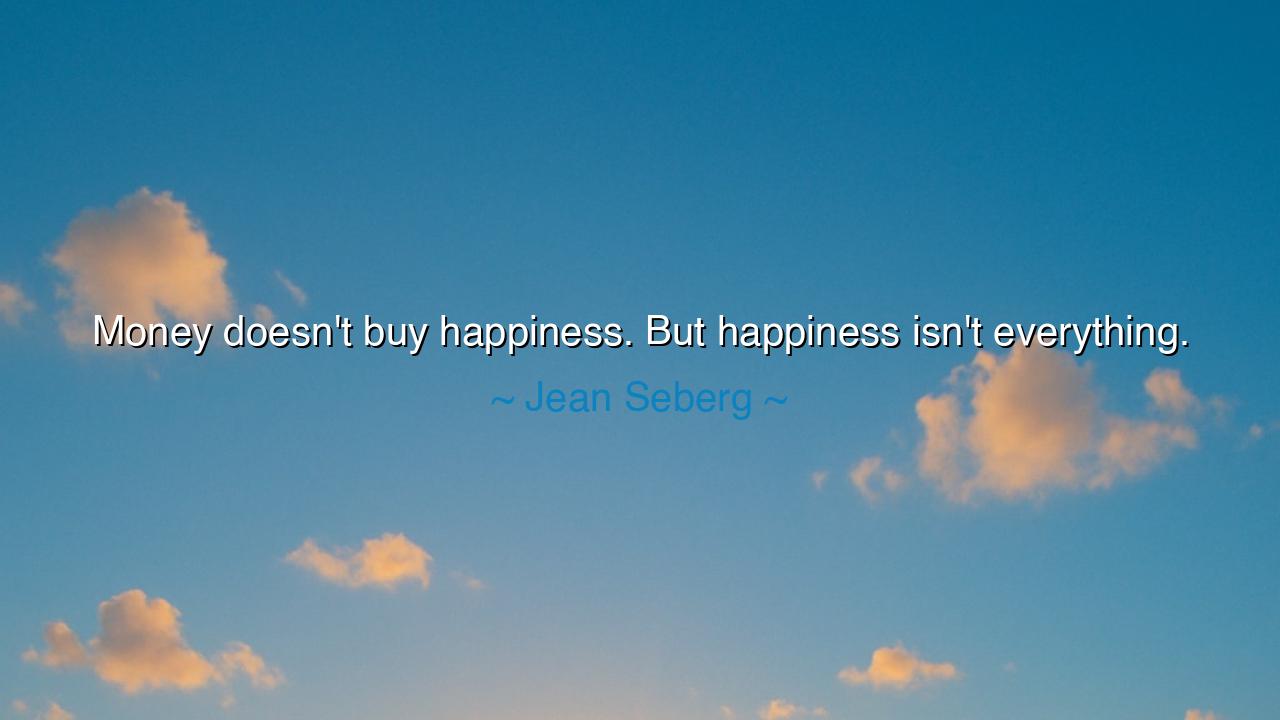
Money doesn't buy happiness. But happiness isn't everything.






Hear now the haunting wisdom of Jean Seberg, the luminous actress whose beauty and brilliance shone through the silver screen yet whose life was marked by sorrow and struggle. She once said: “Money doesn’t buy happiness. But happiness isn’t everything.” These words, at first glance, seem to twist upon themselves — yet within them lies a profound understanding of life’s complexity. Seberg, who had known both glamour and grief, speaks not as one naive to the world, but as one who has touched both its splendor and its shadows. Her words remind us that while wealth cannot purchase joy, neither can joy alone sustain the human soul. Life, she suggests, demands not only happiness, but also purpose, responsibility, and the courage to face sorrow when it comes.
The origin of this quote springs from the paradox of Seberg’s own existence. Born in Iowa and thrust into fame as a teenager, she rose to become an icon of the French New Wave — a symbol of youthful rebellion and modernity. Yet behind her radiant image lay loneliness, controversy, and the crushing weight of public scrutiny. She had both money and fame — the trappings most mortals crave — yet found herself searching for something deeper. In her reflection that “happiness isn’t everything,” she admitted a truth that few dare to face: that joy, though precious, is but one note in the symphony of being. The soul needs more than comfort; it needs meaning — a reason to rise each day beyond the pursuit of pleasure.
The ancients, too, understood this delicate balance. Aristotle, in his teachings on eudaimonia, spoke of happiness not as mere feeling, but as the fulfillment of purpose — a harmony between virtue and destiny. To him, the man who lives only for comfort is like a ship without a compass, drifting endlessly, while the man who lives with principle finds peace even in storm. And in the Eastern wisdom of Buddha, we hear a similar echo: attachment to either pain or pleasure is the root of suffering. True serenity lies not in chasing joy, but in walking the Middle Path, where one accepts life’s fullness — its sorrow, its silence, its beauty, and its burden.
Consider the life of Abraham Lincoln, a man who bore the weight of a nation’s suffering. He was not happy in the common sense — his days were filled with grief, loss, and endless struggle. Yet through his pain, he achieved something greater than joy: he achieved meaning. His endurance, his compassion, his unwavering moral vision gave rise to a peace that outlasted his own lifetime. His example teaches that happiness, though sweet, is not the highest good. Duty, purpose, and truth — these are the pillars upon which lasting fulfillment stands. For even when happiness fades, meaning sustains.
In Jean Seberg’s words, we find both warning and wisdom. She cautions those who believe that money can fill the void of the heart — it cannot. But she also challenges those who worship happiness as life’s ultimate prize. For happiness, when sought without substance, becomes shallow and fleeting. It is not the whole of life, but one of its gifts — to be cherished when it comes, and released when it leaves. The wise do not build their existence upon happiness alone, but upon the steady ground of virtue, compassion, and creation.
To live well, then, is to embrace both light and shadow. Seek happiness, yes — but not at the cost of integrity or growth. Understand that sorrow too has its purpose, for it refines the heart and deepens wisdom. Do not fear the days when happiness seems far, for in those moments you may find something greater — the quiet strength that endures, the love that persists even when joy falters. Life is not meant to be perpetual pleasure, but a journey of becoming — a sacred dance between laughter and loss.
So let this be the lesson passed down like a flame through the ages: Do not worship money, for it buys nothing of the spirit. Do not worship happiness, for it is as transient as morning mist. Instead, seek balance — the kind of life that holds both joy and sorrow with open hands. Cultivate meaning in your work, mercy in your heart, and courage in your trials. Then happiness will visit you not as a prize, but as a companion on the road to wisdom.
Thus, the words of Jean Seberg echo across time — both tender and tragic, both warning and blessing. “Money doesn’t buy happiness. But happiness isn’t everything.” In her paradox lies the truth of all human life: we are meant not only to smile but to strive, not only to feel joy but to grow in soul. Remember this, O seeker — and you will find not fleeting happiness, but enduring peace.






AAdministratorAdministrator
Welcome, honored guests. Please leave a comment, we will respond soon